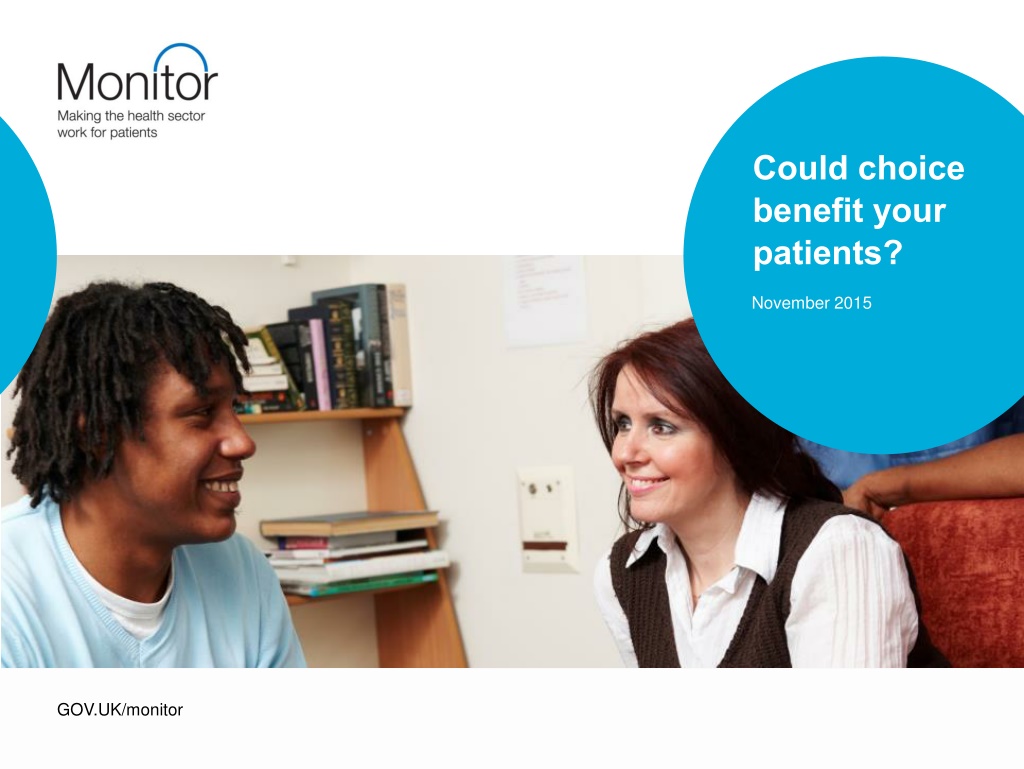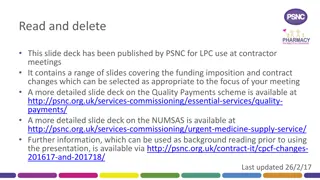Understanding the Importance of Patient Choice in Healthcare Commissioning
Patient choice plays a crucial role in healthcare commissioning, enabling patients to select from a range of providers to meet their individual needs. This approach, known as Any Qualified Provider (AQP), empowers patients and helps achieve local objectives, improving service quality and efficiency. By considering patient choice, commissioners can enhance healthcare delivery and drive positive outcomes for patients. Learn more about the benefits and implications of patient choice in healthcare services.
Download Presentation

Please find below an Image/Link to download the presentation.
The content on the website is provided AS IS for your information and personal use only. It may not be sold, licensed, or shared on other websites without obtaining consent from the author. Download presentation by click this link. If you encounter any issues during the download, it is possible that the publisher has removed the file from their server.
E N D
Presentation Transcript
Could choice benefit your patients? November 2015 GOV.UK/monitor
Index Target audience Using local choice in your area Monitor s assessment of choice in adult hearing services Our evidence the benefits and costs of choice Where to go for further support 2
Target audience The information in these slides aims to provide helpful information for CCGs who are: considering Any Qualified Provider (AQP) for adult hearing services in the process of renewing AQP for adult hearing services considering AQP in other services, as lessons learnt from adult hearing services could apply to other services All of the information included here comes from our report, NHS adult hearing services in England: exploring how choice is working for partners. 4
Why is choice important? Choice as a tool to achieve local objectives Five Year Forward View The role of commissioners The Five Year Forward View identified patient empowerment and patient choice as priorities for the future of the NHS. Following the Procurement, Patient Choice and Competition Regulations, when commissioning services, CCGs should: Patient choice can be used by commissioners to achieve their duties and their local objectives for patients. secure the needs of the people who use the services, improve the quality of the services, improve efficiency in the provision of the services Commissioners have told us they would like more evidence on the risks, costs and benefits of introducing local choice. When improving quality and efficiency, commissioners should also consider if allowing patients a choice of provider can achieve these aims. Click here for more information on local choice in adult hearing services 6
How the AQP approach works Choice in a nutshell Choice (through local AQP) allows any provider, who meets the qualification criteria set by the commissioner (eg minimum quality of care and price) to provide the service in that area. Patients can then choose any qualified provider they wish. How choice works from a commissioner perspective In 2012, the Department of Health asked commissioners to choose services for which they would implement choice through local AQP. Initial priorities were: Commissioners are free to set the service specification, prices and other requirements for a local health service funded by the NHS. Adult hearing services in the community Musculo-skeletal services for back and neck pain Continence services (adults and children) Diagnostic tests closer to home Wheelchair services (children) Podiatry services Venous leg ulcer and wound healing Primary care psychological therapies (adults) Commissioners invite providers to apply to be a qualified provider. Commissioners assess the potential providers and if they comply with the requirements, the commissioner will issue the provider with a contract. If any new providers want to provide the service after the initial qualification phase, commissioners should consider these new providers. GPs can refer and patients can choose to go to any provider in the area who is qualified. Adult hearing services was the most popular option chosen by commissioners. Commissioners will need to monitor the contracts to make sure providers are delivering services at standard required. 7
Key information on hearing loss in England Hearing loss in adults can lead to: social isolation depression loss of independence and employment challenges 14.5m people are likely to have hearing loss by 2031 By 2030 hearing loss will be in the top 10 disease burdens in UK Over 70% of people over 70 and over 40% of people over 50 will have hearing loss 2m people have a hearing aid, and 4m more people would benefit from hearing aids The NHS spends 200m on adult hearing services each year, which includes half a million people referred 8
Before and after Adoption of choice in adult hearing services: Before the introduction of choice: Adult hearing services (for people with age-related hearing loss, who are typically aged 55+) were routinely delivered by acute providers as a part of a wider group of audiology services and often delivered alongside or integrated with ear, nose and throat (ENT) services. After the introduction of choice: Now, hearing services are provided by a wide variety of providers and in a wide variety of places (eg hospitals, the high street, GP surgeries, care homes). 125 of 211 CCGs (60%) have implemented local choice (as of 2015) 9
Monitors assessment of choice in adult hearing services
Monitors assessment of choice in adult hearing services In 2015 Monitor published its review of choice in adult hearing services. Our findings are set out in our report: NHS adult hearing services in England: exploring how choice is working for patients What we wanted to know: How we conducted our research How choice has been working for patients and commissioners Policy desk research Survey of 1,200 service users Invited views from stakeholders - over 600 responses Meetings and site visits Structured interviews with GPs Whether current arrangements serve patients effectively Whether there is scope for improvement Offer insights for commissioners who are deciding whether and how to introduce choice 11
What we found (pt1) Benefits Costs Patients value choice Improved access to services Providers have increased incentive to be responsive to patients needs Better value for money for commissioners Ability to improve service quality through setting the service specification Resources required to qualify providers Resources required to manage multiple contracts Possibility of increased overall spending for the service due to increased numbers of patients getting treated 13
What we found (pt2) Benefits and costs will vary in local areas Cost of alternative commissioning approaches Intensity of benefits and costs can vary depending on the geographical area (eg due to the number of providers already in place before AQP) Alternatives to choice could require similar or higher costs for commissioners. Commissioners should have a clear understanding of the current local situation, the local goals they want to achieve and the feasibility of achieving them, before looking to implement AQP. 14
Benefits: patients value choice Monitor conducted a survey of 1,200 patients to understand how service users were experiencing patient choice in adult hearing services. Most respondents indicated that choice was of value to them. Patients that were not offered a choice Value in having a choice Choice is of no or limited use Patients that were offered a choice 0 50 100 15
What patients said about having a choice: It s always good to have a choice. More choice means better service in my opinion Some places you get a good service, and some places are bad, this way you have a choice to pick from There are many aspects to hearing rehabilitation of which technology is only one. I would have liked the opportunity to go to a practitioner who is prepared to discuss social, emotional and employment aspects I feel that choice is better even if I choose to stay with the service I m with now See chapter 3.1 of the report for more details 16
Benefits: better access to services for patients We found that several aspects of access can be improved through choice. These are: Closer proximity of provider location to patients Shorter waiting times Improved access for specific patient groups (eg housebound patients, residents in care homes) Wide range of accessible locations eg high street, GP clinic More providers after choice was introduced Location Wider opening times during weekdays Convenient appointments Weekend appointments In areas with waiting times of 6 weeks or more, waiting times fell by 2 weeks Waiting times Shorter waits Services tailored to housebound people, care home residents Hard to reach patients New providers See chapter 3.1 of the report for more details 17
Benefits: better access to services for patients In many areas the introduction of choice has made it easier for patients to access services. This case study shows that the number of provider sites increased from 5 to 32, and the number of providers increased from 4 to 6. This means that 90% of patients (by using GP practices as proxies for patients location) are able to access a provider within a 20 minute drive. Up from 50% before the introduction of choice. Accessibility in North Norfolk, South Norfolk and Norwich CCGs Before choice After choice 18
In contrast: Before the introduction of choice, patients in Brighton and Hove already had access to multiple sites. Following the introduction of choice, the number of provider sites increased from 6 to 7, and the number of providers increased from 1 to 3. The increase in access was limited, only 5% more patients were able to access a provider within a 10 minute drive. Accessibility in Brighton and Hove CCG Before choice After choice 19
Benefits: innovation and quality, value for money Innovation and responsiveness: New providers added with the introduction of choice need to offer high quality services and differentiate themselves to attract patients. Differentiation we have seen includes: Extending the range of hearing aids offered to patients Tailoring aftercare to patients needs and preferences Offering other support services Higher expectations of service quality: Most commissioners used the service specification set by the Department of Health. This specification sets out higher or more explicit requirements on providers than previous arrangements. It also sets out key service outcomes which providers have to measure, record and report periodically to commissioners. This way commissioners can monitor whether providers are delivering to the standard required. 20
Benefits: lower price per patient and better access to data Lower price per patient The service specification included a suggested price, but commissioners are free to set prices for the service. Many commissioners have amended the original DH specification price. In some cases the locally determined prices have been 20-25% lower than the national non-mandated tariff. Access to service-level data The service specification establishes a set of quality requirements, KPIs and other outcome measures. Providers are required to collect data and report to commissioners. Commissioners can use data to: secure the needs of patients and improve the quality and efficiency of services (eg by comparing providers data) understand more precisely how their budget is spent forecast their expenditure more accurately 21
Costs: manage multiple contracts 1. Commissioners will need to manage multiple contracts Commissioners will need to provide each qualified provider with a contract The number of contracts is likely to increase following the introduction of choice Managing these contracts can take time and resources Please note: Some commissioners said once initial reporting systems and arrangements were in place, the resources required to manage contracts was not disproportionate to the value gained from implementing choice. 22
Costs: qualification process 2. Qualification process Qualifying providers will require commissioners resources Providers can find applying to a qualification process costly Please note: Any commissioning process will involve some degree of resources to select providers most suited to delivering services The process should be proportionate. Commissioners can find ways of making the process less burdensome (eg early engagement with providers) See Top Tips 2 & 4 in our Top Tips for Commissioners 23
Costs: potential increase in overall spending 3. Increase in overall spending Increased access can lead to more patients being treated Some commissioners reported increases in spending in excess of 30% in the first year Although the price per patient may go down, overall spending on hearing services may increase Please note: We found no evidence of provider-induced demand. Increased spending is likely to cover demand that was previously unmet See Top Tip 6 in our Top Tips for Commissioners 24
Weighing up the costs and benefits Commissioners need to consider both the local impact in terms of costs, as well as the benefits of introducing choice. Benefits: Costs There are both short and long term benefits for patients Costs: In the long term, choice has the potential to reduce pressures on health and social services that could result from unaddressed hearing loss Some costs are one-off or short-term Benefits Some costs may be incurred using other commissioning approaches 25
Where to go for more support Many helpful resources can be found on the Monitor website, including: The full report and supporting research (such as the patient survey and the interviews with GPs) Top tips on implementing choice well in adult hearing services Access to the joint webinar between Monitor and NHS Clinical Commissioners on practical learning from the report. Other resources, such as the original Department of Health service specification for AQP adult hearing services. Please contact Monitor if you have any questions about the report: Phone: Luke Dealtry on 020 3747 0228 Email: cooperationandcompetition@monitor.gov.uk 27























